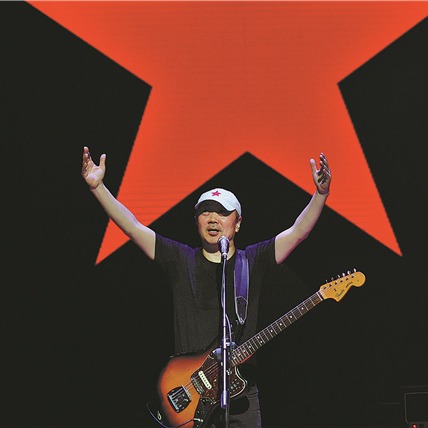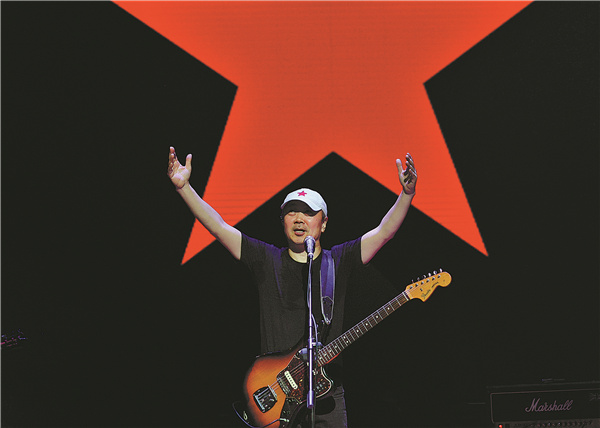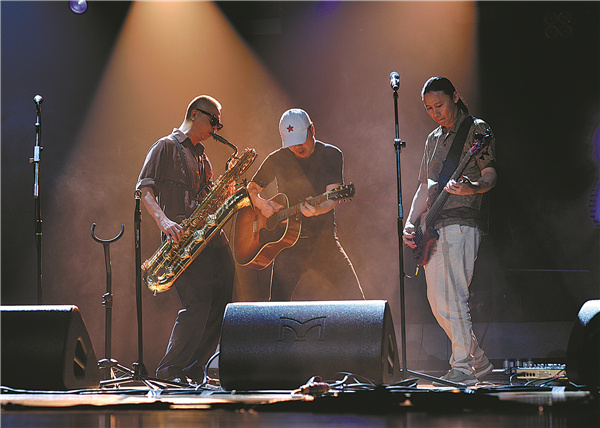

Wearing a black T-shirt and a pair of loose shorts, Cui Jian appears in a restaurant in downtown Beijing on a weekday afternoon. With his trademark white baseball cap with red star pulled low over his face, he tries to keep a low profile and walks quickly to the balcony, where he sits down near a table and orders a can of ginger ale.
The veteran rock singer-songwriter is legendary figure in Chinese rock music, the media calling him "the godfather of Chinese rock 'n' roll".
When Cui stepped onto the stage to perform at a concert at the Beijing Workers' Stadium in 1986, few Chinese knew what rock 'n' roll was. At the packed venue, Cui, then 25, performed his original song Nothing to My Name. That marked the start of a long journey both for him and rock music in China.
Two weeks ago Cui released his latest album, A Flying Dog, and now he is ready to talk about it. He spent a long time making the album, featuring eight original songs he wrote between 2017 and 2018, and he says it is in line with his ideas of musical experimentation.
"I delayed the release because I wanted to make each song sound perfect. I was in no rush. I do the recording in my own studio, getting up in the afternoon and working until 3 o'clock the next morning. Of course the studio is soundproof, which means I can play my trumpet in the wee hours without worrying about disturbing my neighbors."
The opening song, A Flying Dog, first released in March, is a solid piece of work that is powerful and thought-provoking, the official translation for the opening lyrics being:
Sitting in front of the computer and looking like a dog,
The digital world is like a vast grassland and all the information feeds you,
An idea came into my mind, which is like time-traveling,
I walk with the grassland, against all rules. The second song, B-Side of Time, is a reflection of Cui:
Looking into the fun-house mirror, I see the A-side of time,
Just like everybody else, I can only see my own face,
Are you really there within, being transformed by the age?
Suddenly someone shouts back, "Why the hell would I change?"

In addition to songs with observations that have an acerbic edge, he also wrote songs such as Doomsday Beach, which are poetic and romantic.
In the preface Cui wrote for this new album, he said: "Time bending, emotion compressed. The past is like ice and the present is fire.… Is 2021 a good time to release an album? … By the time I finished the eighth song, I had no energy left, … which is to say I felt I was balanced."
He quotes the lyrics of the song Doomsday Beach in the preface:
I long to be blown by strong winds,
I long to be pushed by big waves,
But the sea is as dry as the wind and the wind is as tender as water.
Along with his band members, including an old friend, the saxophonist Liu Yuan, and the young drummer Xu Zhitong, Cui devoted much of his time working on the melodies and rhythms of the songs.
"It really matters to me because sound is feeling," he says. "You physically move with the melodies and rhythms, which is one of the best things about music. Lyrics are just the enunciation of words that fit the rhythms."
The new album has received mixed reviews among Chinese rock lovers, many highly impressed with the effort, but others calling it eccentric and impenetrable.
Mixed reviews are nothing new for Cui. His last album, Frozen Light, which came out six years ago, confounded many listeners to the extent that some of his fans deserted him.
Cui insists that he feels great about Frozen Light, as he does about A Flying Dog.

"When I worked on my songs, it was a process of communicating with them. They evolve by themselves and have their own directions. I just follow them. It was a pleasant and comfortable process. However, when the songs are released they have nothing to do with me. In the marketplace they have their own destiny, and I don't care about that.
"I reckon those who initially love this new album may lose interest in a few years and go back to my early albums."
For Cui, each album is a reflection of his own evolution as a musician. From when he made his second album, Solution, released in 1991, he started to ignore the market and do his own musical experiments, he says, which are about his own aesthetics on music.
"My first album was pop rock, which appealed to the mainstream music market. But when I tried to do punk rock in my second album, some people considered it a betrayal. People wouldn't stop questioning and doubting. I'm clear about what I want to do; over the long term you can't do just one thing."
Born into an ethnic Korean family with parents who were both artists, Cui took up the trumpet at the age of 14, following his father, and in 1981 he began his musical career, joining the Beijing Philharmonic Orchestra.
During his six years with it he began writing some of his own songs and formed a band with six other musicians, one of the first of its kind in China.
His first album, Rock 'n' Roll On The New Long March, released in 1989, was a huge success, becoming a classic, and would eventually inspire a string of Chinese rock musicians.
Cui has released seven full-length albums, he says, and these have allowed him to try a diversity of musical genres, including hip-hop, jazz and reggae.
He has also directed movies, including Blue Sky Bones in 2013.
At 60 his eyes are still wide-open. He loves talking with young people and opens up to them, he says.
"Last night I attended a young man's birthday party, where I met lots of young people. We chatted and one of them told me that he cried when he listened to my song Under Sun Dreaming. I asked them what kind of music they like and I wrote down the bands' names they mentioned, mostly Western bands, and I listened to their songs after I got home.
"I would love to share my knowledge and experience about music. There are many talented young musicians out there, and we work together."
Cui is proud to say that he has never stopped performing live, either at small venues or on big stages. He enjoys traveling from one city to another performing constantly, he says.
"No matter the size of the audience, I feel excited when I perform on stage. I can say that touring now is better than ever. I know how to use my voice, how to communicate with the audiences and how to deliver my messages through live music."
With the release of the new album, Cui mentions the Live Vocal Movement, which he established in Beijing nearly 20 years ago, pressing for a ban on lip-synching. However, this day lip-synching is used in performances on TV, reality shows and online shows.
"The market decides what's popular and sets the trend," Cui says. "Young people are easily attracted to flashy stuff that companies pour tons of resources into designing. Real music is about taking risks; this incredibly popular commercial stuff is just about gaining the maximum number of clicks."
If you have any problems with this article, please contact us at app@chinadaily.com.cn and we'll immediately get back to you.